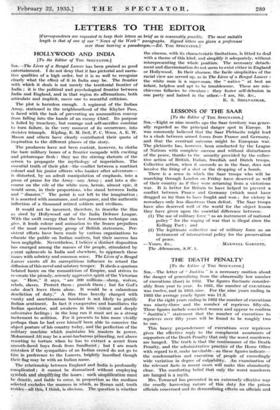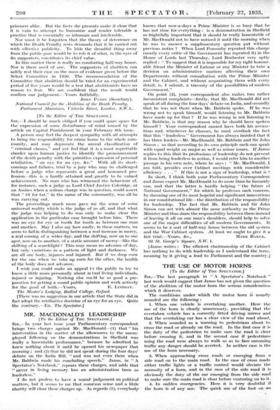THE DEATH PENALTY
[To the Editor of THE SPECTATOR.] Sm,—The letter of Justitia " is a necessary caution about the danger of generalizing from the abnormally low number of executions (four) in 1932. The figures fluctuate consider- ably from year to year. In 1931, the number of executions was twelve, and in 1933, nine. For the nine. years ending in 1933 the average yearly figure was For the eight years. ending in 1932 the number of executions was ninety-three and the number of. reprieves fifty-Six. These figures include convicted women and appear to confirm " Justitia's " statement that the number of executions to reprieves over fifty years will be found .to be ioughlY two to one.
This heavy preponderance of executions over reprieves _ gives the effective reply to the complacent assurances of supporters of the Death Penalty that only the worst murderers . are hanged. The truth is that the continuance of the Death Penalty, aria the administrative practice of the Home Office with regard to it, make inevitable—as these figures indicate— the condemnation and .execution of_ people of exceedingly wide variation in degree of culpability. ;An examination of the. relevant facts in recent cases will make this abundantly clear. The comforting belief that only the worst murderers
are hanged is a myth. . . _ Mrs. Townend has presented in an extremely effective way - the cruelly harrowing nature of this duty for the prison officials concerned and its demoralizing effects on officials and prisoners alike. But the facts she presents make it clear that it is vain to attempt to humanize and render tolerable a practice that is essentially so inhuman and intolerable. Nor must it be forgotten that the theory of deterrence on which the Death Penalty rests demands that it be carried out with effective publicity. To hide the dreadful thing away from the public gaze would be to rob it of what, in the eyes of its supporters, constitutes its chief value.
In this matter there is really no comforting half-way house. Nor is there need of one. The supporters of abolition can safely rest their case on the mass of evidence given before the Select Committee in 1930. The recommendation of the Committee that abolition should be tried for an experimental period of five years would be a test that abolitionists have no reason to fear. We are confident 'that the result would confirm our judgement.—Yours faithfully,
JOIIN PATON (Secretary).
National Council for the ..4bolition of the Death Penalty, Parliament Mansions, Viiioria Street, London, S.IV.1.



















































 Previous page
Previous page